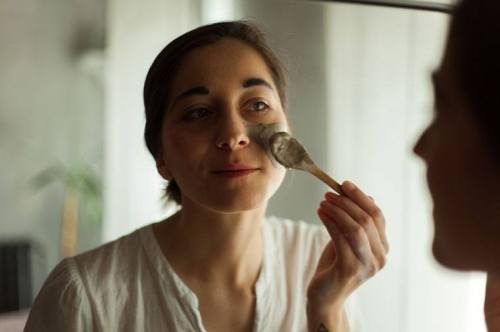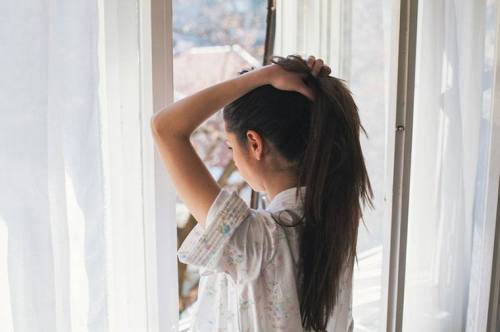In August of 2017, Iowa hairstylist Kayley Olsson wrote a Facebook post about a 16-year-old girl who came into her salon, her hair severely matted and in knots. Crippled by depression, the girl had stopped brushing her hair—or even leaving her bed except to use the restroom. “Just shave it,” she told Olsson, according to the post. “I feel worthless. This is worthless.”
Like this young woman, I had my first bout of major depression as a teenager. And it wasn’t until college—when I was wrapped up in the high-pressure environment of internships, work-study jobs, final papers, and, you know, figuring out how to be a grownup—that I was formally diagnosed. All through my undergrad years and while I was taking baby steps into a career in women’s magazines, I underwent a wrenching trial-and-error process to find the right medication to stabilize my mood. Keeping up, let alone getting ahead, could feel impossible—especially when I knew I needed to look the part of a professional.
Back in high school, rolling into class with an oily topknot and sweats had no bearing on my grades—but in the real world, looks do matter. A 2016 study from the University of Chicago and UC Irvine found that women between the age of 24 and 32 who put more effort into their appearance are more likely to get ahead professionally (as opposed to men, who are able to benefit from their “natural good looks”).
According to experts, maintaining your daily routine—including hygiene and self-care habits—may be key to staving off the worst of your depression.
Unfortunately, during a depressive episode, basic hygiene practices can require the same energy level as a triathlon. Worse still, neglecting your skin-care and grooming routine only exacerbates the depressive state for some people. “You start to think, what’s the point of showering and going outside? No one wants to see a face like this,” says Claire F., 29, who’s been diagnosed with depression and anxiety.
According to experts, however, maintaining your daily routine—including hygiene and self-care habits—may be key to staving off the worst of your depression. With a therapeutic technique called behavioral activation, patients are asked to take note of when their depressive symptoms start to creep in and counteract them by engaging with the world, rather than isolating themselves. “It’s a process of rebuilding structure and routines with the idea that mood and motivation will improve in turn, including beauty routines,” says Amanda Allen, PhD, a clinical psychologist in New York. “It might seem trivial, but it’s actually an effective foundation to develop structure when it’s needed most.”

Because depression is so all-consuming, it was years before I realized how the degradation of my appearance fed into my own mood disorder. Once I did, I wanted to seize control of this potentially manageable aspect of my day: But I found there was a dearth of useful, realistic advice online for someone with clinical depression. A Google search resulted in more general “anti-stress” techniques for people who aren’t battling chemical imbalances. “Take a spa day with a girlfriend?” I remember thinking. But I can barely get out of bed.
“Take a spa day with a girlfriend?” I remember thinking. But I can barely get out of bed.
Over time, I’ve developed a bare-bones self-care and skin-care maintenance technique to fall back on during major depressive episodes. (Claire devised a similar solution: “I’ve learned through hard experience not to give up on putting on my acne lotion twice a day, even if that’s all I can do,” she says.) Here’s what it looks like:
1. I keep a giant bottle of water by my bed/couch/pit of despair to stay hydrated, which helps both inside and out.
2. In case I can’t drag myself to the sink to wash my face, I stockpile cleansers that don’t require water: face wipes and micellar water, which I apply with cotton pads.
3. Low-maintenance (but not no-maintenance) is also the name of the game when it comes to hair-care. “For keeping hair clean, just use one simple product, like a detangler spray,” says Allison Wolf, a hairstylist at Fox and Jane in Brooklyn, who’s also experienced depressive phases. “The more product you use after washing your hair, the more buildup you’ll get.” She also recommends ditching your tight elastic hair ties: A soft scrunchie will help prevent the breakage that comes with keeping your hair in a ponytail for long stretches at a time.
4. If I’m behind on laundry, I’ll turn my pillowcases inside out: Between irregular cleansing, incomplete makeup removal, and the normal accumulation of dirt and toxins, your bedding can quickly become a hotbed for acne.
5. I find ways to integrate self-care without adding time to my day (my own form of behavioral activation). Throwing on a sheet mask after cleansing in the evenings designates a 20-minute window of time that I use for other small self-care rituals, like picking clothes up off the bedroom floor or lighting a candle. Bonus: The essential oils in the mask and candle give me a small boost of energy; small studies have shown rosehip oil to alleviate the stress and mood issues associated with depression.
Awareness of the link between self-care and depression is growing—and Kayley Olsson’s Facebook post is evidence of that. Instead of giving the Iowa teen the big chop she asked for, Olsson and her styling team worked tirelessly over the next two days—for a total of thirteen hours—to save the girl’s hair. After it was finally done, says Olsson, the work was all worth it to see the girl smile. According to the post, the teen said, “I will actually smile for my school pictures today. You made me feel like me again.”
Need more convincing that self-care is essential? Here’s how you can use the ritual to become empowered as well as channel your newfound rejuvenation to help lift up your community.
Sign Up for Our Daily Newsletter
Get all the latest in wellness, trends, food, fitness, beauty, and more delivered right to your inbox.
Got it, you've been added to our email list.











